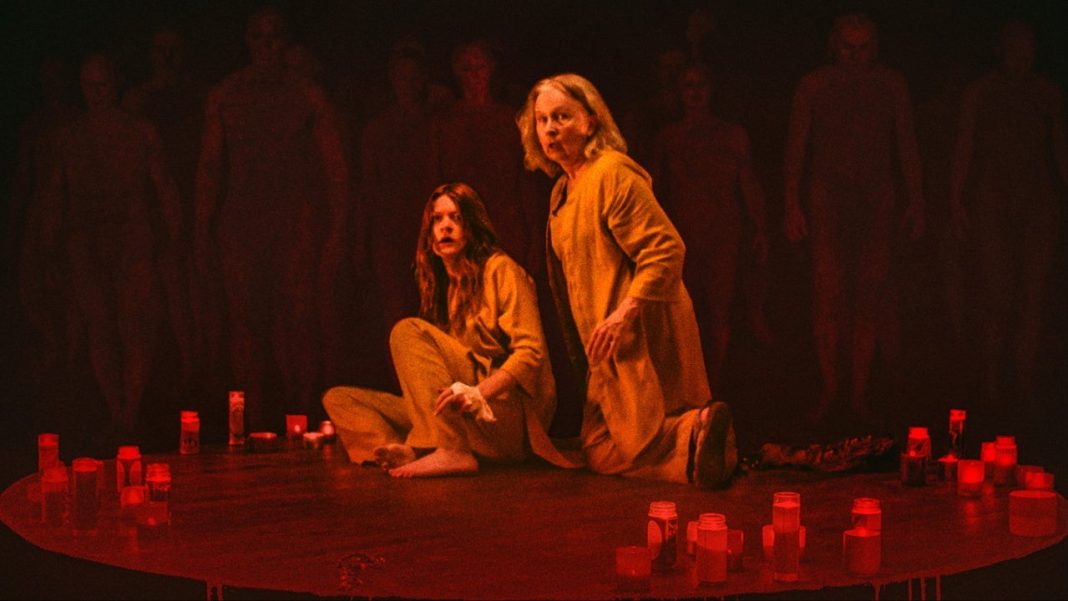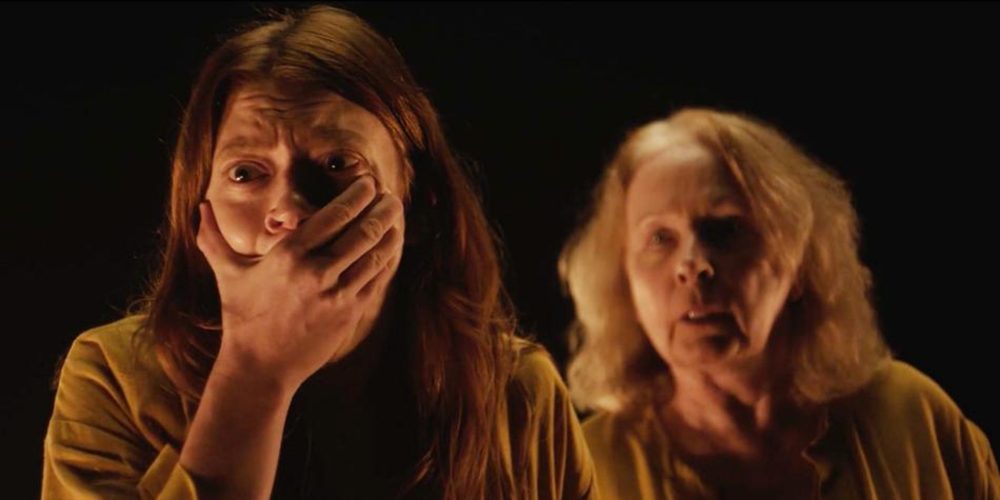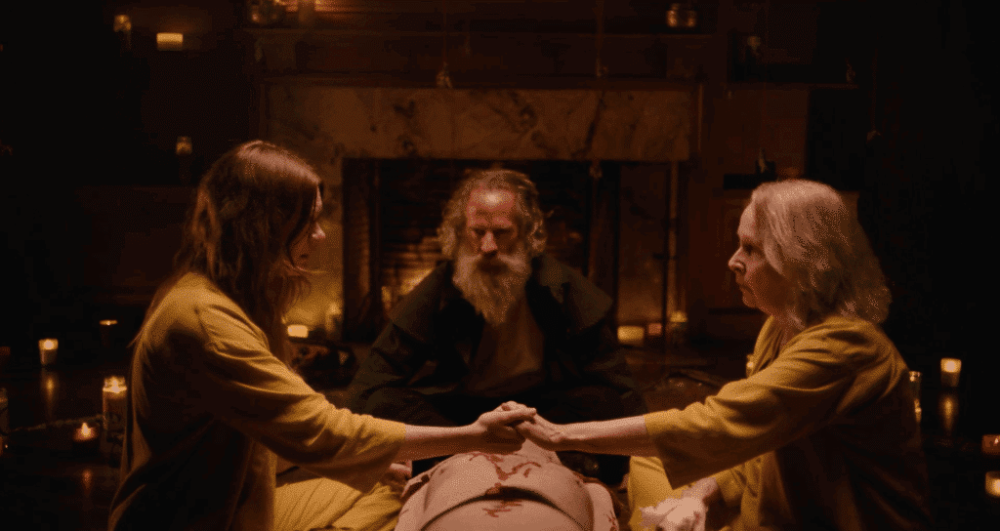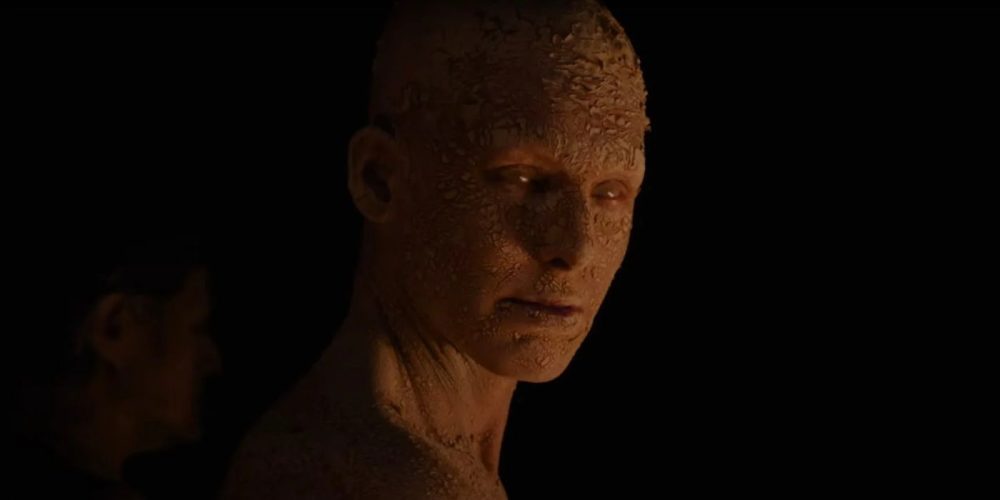It’s been difficult to trust new horror movies as of late. Often, their premises astound. Be it Talk To Me’s handshake haunting setup or Barbarian’s puzzle box structure, these movies pull audiences in with the promise of new terrors that carry the potential to change the entire landscape of the genre. And then, once we finally get to see what they have to offer, what we get is a grand showing of metaphor-first storytelling that cannibalizes the narrative in favor of blunt signposting that instructs the audiences on the things they should be thinking about. In most cases, it’s even common to see a character spell out exactly what the metaphor is, in case a few stragglers missed it.
Julia Max’s The Surrender (now streaming on Shudder) has one of those great premises that can reel in horror fans looking for something new. It has some folk horror in it, a dry but effective sense of dark humor coursing throughout, and a good eye for scares in key places. Question is, does it keep its metaphors in check, or do they run away with the story?
The Surrender follows a mother-daughter relationship that’s long been mired in resentment and guilt as they navigate the death of the family patriarch. The daughter (Colby Minifie) has only recently come back to her childhood home to help her mom (Kate Burton) deal with her father’s terminal condition.
The mother, though, has taken to crystals and DIY-variety witchcraft to help keep her husband alive. Once the magic fails, a strange man is brought in by the mom to resurrect her husband through a ritual that compels the soul to return to its body, all at the very panicky and intense objection of her daughter. As to be expected, things go South in more ways than one, leaving the mom and the daughter in a distinctly precarious situation.
The Surrender succeeds at something its contemporaries struggle with right off the bat: it’s not just about one thing. At a surface level, it would be easy to think the entire story will center on grief (like Talk To Me, and Hereditary, and Daddy’s Head, and many others). All the elements are there for it and director Julia Max could’ve stayed there to keep with current genre trends. But the father’s death opens up multiple considerations regarding how we deal with loved ones in the immediate moments after death and how our memories of those who pass get shuffled around and distorted in the process.
Max, who also wrote the screenplay, does an excellent job of using flashbacks to portray the father as an imperfect man that had as many great qualities as he had bad ones. Each of these instances provide a lot of character work, and it makes the resurrection angle more complex. There are no absolutes here. The movie argues that death ignites a memory play that can trick the surviving parties into erasing the bad for a more sanitized view of the dead. It’s something we do to dodge some of the pain in that loss, to detach somewhat from the unresolved things that death closed the book on. It’s not truth we’re after in these moments. It’s comfort.
In this context, the mom and the daughter are essentially battling for memory. Which version should have more authority becomes a question that colors a lot of the resurrection ritual. And yet, while these ideas and meanings hover over the proceedings, the movie stays committed to being a horror movie with creepy supernatural components that surface organically. Max finds horror in quiet moments that jolt without the need of thundering soundtrack cues. The ritual itself feels serious and ancient, and there’s a real sense of risk in attempting to bring the patriarch back to life.
Colby Minifie and Kate Burton deserve a lot of credit here. Their daughter-mother relationship goes from loving to spiteful at the drop of a hat, helping to establish a broken sense of love between them that is incapable of resolving itself. It can get a bit satirical, too. This comes through in the daughter’s perceived ridiculousness of the resurrection idea and how her mother has just accepted it as a real possibility. It lands thanks to the duo’s ability to never break with the severity of their terrifying actions. Through them we can also think about the struggle for ownership of the deceased and how some claim to be the most affected by the loss as if it were a competition.
Dialogue sequences can turn ugly as a result, with both mom and daughter standing their ground on the decision to resurrect a dead man. As such, alternative medicine also becomes part of the story’s wide range of meanings, especially as it points to a false sense of hope founded on magical thinking.
So far, it all points to The Surrender being a successful attempt at circumventing the pitfalls of the other horror movies alluded to here. There are a lot ideas floating around, but they don’t get in the way of the story. Characters are believable within the film’s logic and they’re fleshed out. They don’t come off as mere metaphorical markers. The horror aspects feel storied, as if they’re a part of something bigger and scarier. It all falls into place quite convincingly. And then we get to the closing moments, where a lot of that good work is put to waste.
In the final moments, one of the characters goes on a short monologue that essentially tells the audience what the movie’s message is supposed to be. Nuance is thrown out the window, robbing the story of its believability (which is not the same as realism) in favor of an emotional payoff we’ve gotten many times before and executed in nearly the same manner. The path to acceptance is laid out before one of the main characters, breaking with the film’s logic thus far, and a literal moment of clarity manifests so that the audience is shown the way to successfully dealing with death. And then the credits roll.
Suddenly, The Surrender turns its back on storytelling for a closing that’s more cringe-inducing than anything. The prospect of a unique finale that sees the story through gets thrown to the wind for the message. Instead of inspiring thought, it blurts out the main idea and calls it a day. We’re left with little room for interpretation, essentially clipping the wings of what was a great horror movie with a strong premise.
There’s nothing wrong with meanings, messages, and metaphors in horror movies. Hell, every movie is about something. There’s no disputing this. The problem is some of them sacrifice story for message when they don’t need to. Not every contemporary horror movie falls victim to this. Some achieve the balance and are all the more memorable for it (consider Arcadian, When Evil Lurks, Dark Match, and Exhuma to name a few). The Surrender was almost there. Unfortunately, it decided to trip itself up by closing the conversation on the many ideas it brought to the table by spelling things out for its audience. It’s the most common side effect of bluntness. When you’re told what the meaning behind everything is supposed to be, what else is there to talk about?












